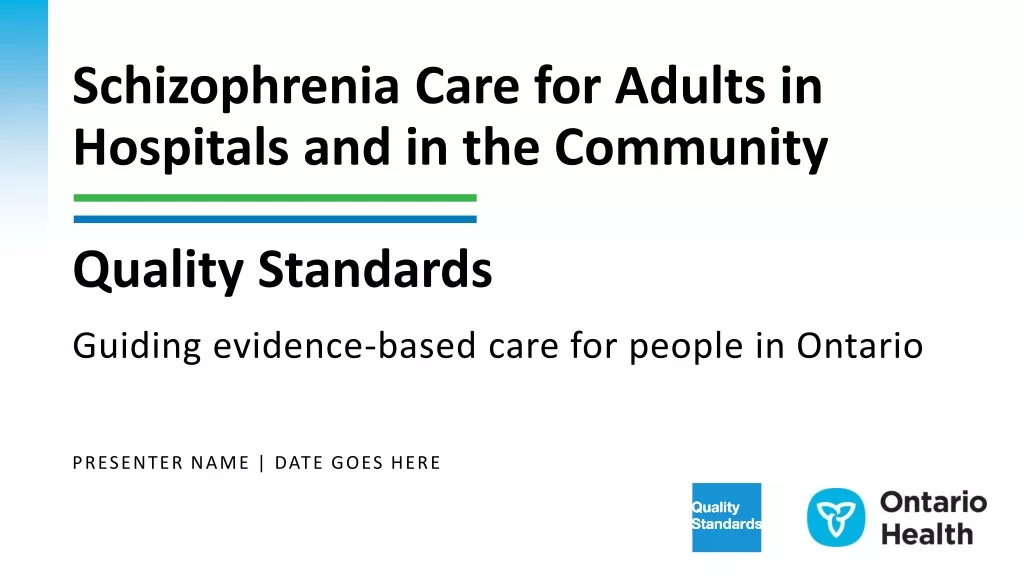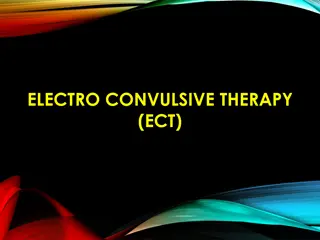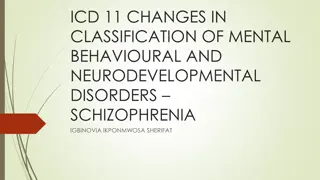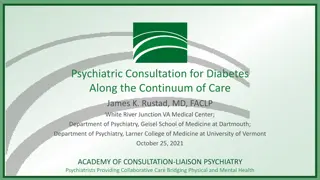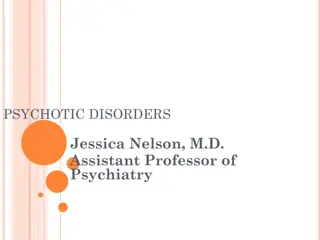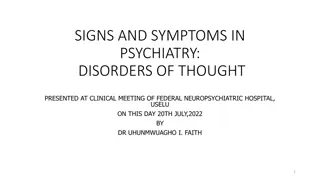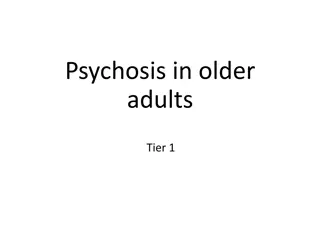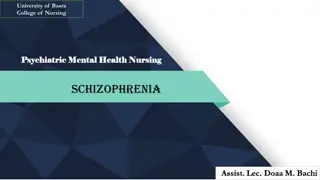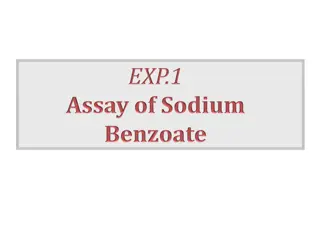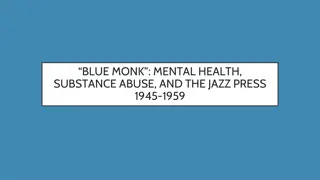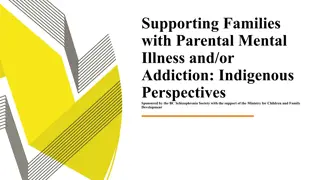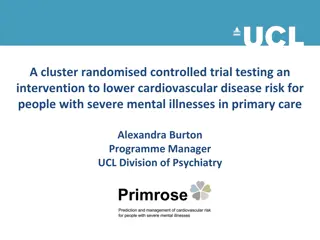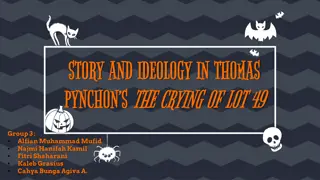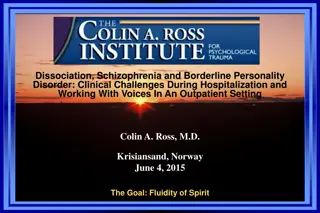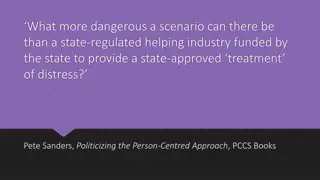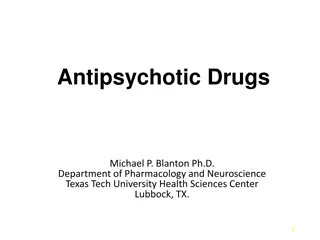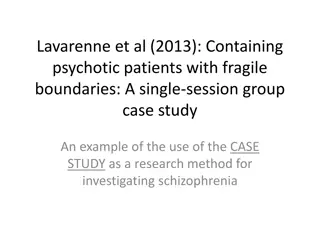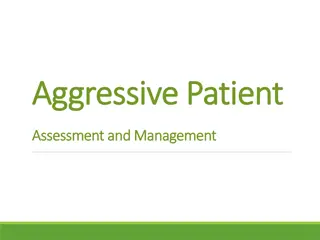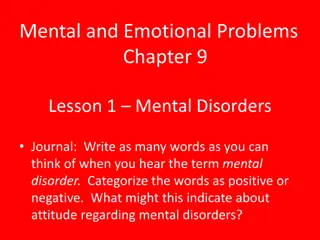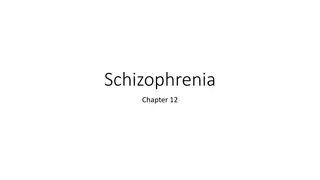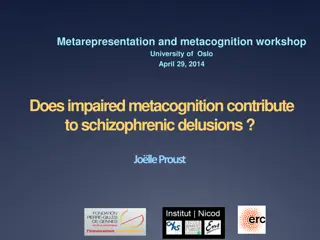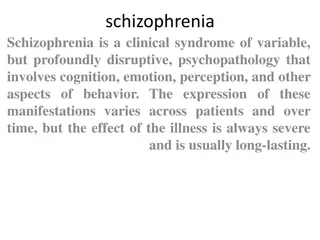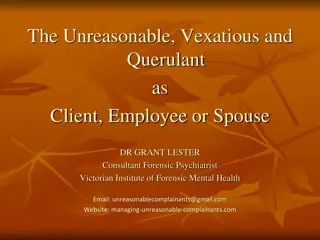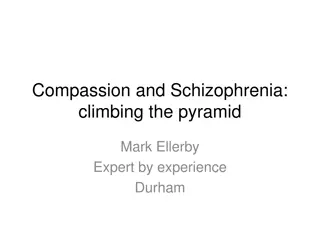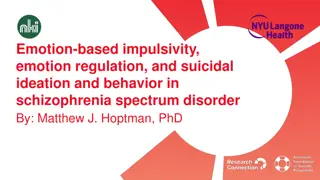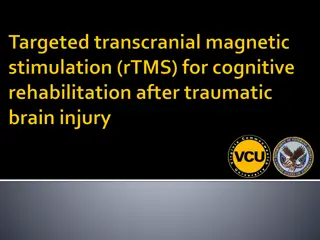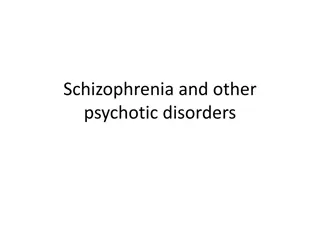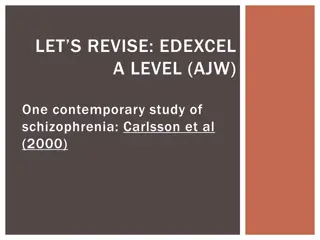The MHCAG in 2023 and 2024
MHCAG's most productive year in 2023 through publications on medication treatment for adults with GAD, antipsychotic medication algorithms for schizophrenia, and more. Plus, discover the group's increased consultations with the P&T Committee. Look ahead to 2024 with potential topics and planned revi
2 views • 4 slides
Dr Hritu
Bhopal's proficient psychiatrist since 2014, excelling in diverse mental disorders. Specializing in women's mental health, she envisions affordable mental health treatment for all in Bhopal. Renowned for exclusive research on Depression among Diabetes patients, her central clinic offers expert care
3 views • 1 slides
Schizophrenia Care Quality Standards in Ontario
Explore the quality standards for schizophrenia care in hospitals and communities in Ontario. Learn about the importance of these standards, key quality statements, and measures to support improvement. Discover resources for clinicians, patients, and organizations to ensure consistent, evidence-base
0 views • 69 slides
Understanding Antipsychotic Drugs and Their Classification
Antipsychotic drugs, also known as neuroleptics, are essential in treating schizophrenia and other psychotic disorders. They work by targeting dopamine and serotonin receptors in the brain, managing symptoms like hallucinations and delusions. Learn about the dopamine-serotonin hypothesis of schizoph
9 views • 21 slides
Understanding Electroconvulsive Therapy (ECT) for Psychiatric Treatment
Electroconvulsive Therapy (ECT), also known as electroshock, is a psychiatric treatment that induces seizures in anesthetized patients for therapeutic purposes. ECT has a controversial history but is well-established in the medical field. Introduced in 1938, ECT has replaced older treatments like in
1 views • 17 slides
Understanding Changes in Classification of Schizophrenia from ICD-10 to ICD-11
Schizophrenia, a complex mental disorder, has been classified differently in the ICD-10 and ICD-11 manuals. This article explores the diagnostic criteria for schizophrenia in both classifications, highlighting the changes made in the transition. It discusses the epidemiology of schizophrenia, preval
0 views • 34 slides
Psychiatric Consultation for Diabetes: Enhancing Care at the Intersection of Mental and Physical Health
This presentation by Dr. James K. Rustad explores the critical role of consultation-liaison psychiatrists in managing diabetes along with mental health conditions like schizophrenia. It delves into the prevalence of diabetes, particularly among specific demographic groups, and highlights the complex
0 views • 35 slides
Understanding Psychotic Disorders: Insights from Schizophrenia
Explore the diagnostic criteria, neurobiological factors, and differential diagnoses of psychotic disorders, focusing on Schizophrenia. Delve into the history, epidemiology, and key characteristics of Schizophrenia to gain a comprehensive understanding of this complex mental health condition.
2 views • 107 slides
Understanding Thought Disorders in Psychiatry: Insights from Clinical Meeting Presentation
Explore the definitions and divisions of thought disturbances in psychiatry, including disorders of thought stream, form, content, and possession. Delve into thought stream disorders like tempo and continuity disruptions, as well as form of thinking disorders seen in conditions like schizophrenia. G
1 views • 32 slides
Understanding Psychosis in Older Adults
Psychosis in older adults involves a loss of contact with reality, including hallucinations and delusions. Symptoms vary but can include disordered thoughts, behaviors, and negative symptoms. It is common in older adults and can have various causes, such as delirium, mood disorders, dementia, and su
0 views • 10 slides
Understanding Schizophrenia: Symptoms and Clinical Features
Schizophrenia is a complex mental health disorder characterized by distorted thoughts, perceptions, emotions, movements, and behaviors. It is not a single illness but rather a syndrome with various symptoms, similar to cancer. The onset typically occurs in late adolescence or early adulthood, with p
0 views • 39 slides
Sodium Benzoate: Properties, Applications, and Pharmaceutical Uses
Sodium benzoate is a white crystalline powder with various physical and chemical properties. It is commonly used as a preservative in pharmaceutical formulations, cough preparations, and cosmetic products. Additionally, it has pharmaceutical applications in treating urea cycle disorders and schizoph
0 views • 9 slides
The Impact of Mental Health on Jazz Legend Thelonious Monk
Thelonious Monk, a jazz icon, faced struggles with mental health, including an involuntary hospitalization and a misdiagnosis of paranoid schizophrenia. Later diagnosed with bipolar disorder, his symptoms affected his music career and personal life, highlighting the intersection of creativity and me
0 views • 6 slides
Indigenous Perspectives on Supporting Families Facing Parental Mental Illness and Addiction
This event, hosted by the BC Schizophrenia Society with the support of the Ministry for Children and Family Development, focuses on supporting families dealing with parental mental illness and addiction from Indigenous perspectives. It includes discussions on strengthening mental health systems, com
0 views • 10 slides
Understanding the Burden of Mental Disorders and the District Mental Health Program
Mental disorders such as depression, schizophrenia, and dementia affect a significant portion of the population in India. The National Mental Health Survey highlighted the prevalence of these conditions and the need for intervention. The District Mental Health Program aims to provide essential menta
1 views • 19 slides
Case Study: CBL Elbow Pain Assessment in a 62-Year-Old Man
A 62-year-old man presents with elbow pain, swelling, and discharge, worsening over 5 days without history of trauma. Further history reveals DM type II, mild schizophrenia, suicide attempt, and previous elbow fusion for fracture. Socially, he is married, jobless, a heavy smoker, with unclear alcoho
0 views • 35 slides
Cluster Randomised Controlled Trial for Cardiovascular Disease Risk in Severe Mental Illness
A cluster randomised controlled trial is being conducted to test an intervention aimed at reducing cardiovascular disease risk for individuals with severe mental illnesses in primary care settings. Led by Professor David Osborn at UCL Division of Psychiatry, the study is funded by the National Insti
0 views • 21 slides
Understanding Severe Mental Illness in Mothers: Impacts and Support
Mothers with severe mental illnesses like Schizophrenia face unique challenges in parenting. Support from partners, family, and the community is crucial for their well-being. Despite the difficulties, with proper treatment and support, women with severe mental illnesses can effectively fulfill their
3 views • 23 slides
Exploring Stigma in Early Detection of Psychosis Among Young People
This research focuses on stigma associated with identifying at-risk individuals for psychosis. It delves into the impact of societal perceptions on mental health outcomes, presenting findings from studies on public stigma, discrimination, and self-stigma. The study also examines how cultural factors
0 views • 46 slides
Analysis of Ideology in Thomas Pynchon's "The Crying of Lot 49
This analysis delves into the story and ideology in Thomas Pynchon's novel "The Crying of Lot 49". The plot follows Oedipa Maas as she investigates the mystery of Tristero, a secret postal service. Set in California during the 1960s, the novel reflects the societal context of America during the Cold
0 views • 15 slides
Understanding Schizophrenia, Dissociation, and Borderline Personality Disorder
Clinical challenges and treatment approaches for schizophrenia, dissociative identity disorder, and borderline personality disorder are discussed in this content. The genetic and environmental factors influencing these conditions are explored, along with insights from twin studies and treatment effi
0 views • 23 slides
Understanding the Needs of Carers Supporting Individuals with Schizophrenia and Substance Use Disorder
This study focuses on identifying and prioritizing the needs of carers who support individuals living with schizophrenia and a substance use disorder. The research highlights the challenges faced by carers, the positive effects of their support, and the lack of studies addressing their specific need
0 views • 39 slides
Challenging State-Regulated Mental Health Approaches
The text questions the effectiveness and ethics of state-regulated mental health treatments, dismissing the biological approach as ineffective. It emphasizes the importance of listening, challenges the diagnostic labeling of conditions like schizophrenia, and advocates for understanding what has hap
0 views • 18 slides
Overview of Antipsychotic Drugs and Treatment for Psychotic Disorders
Antipsychotic drugs play a vital role in managing psychotic disorders by targeting dopamine and serotonin receptors. This overview covers the mechanism of action, classification (typical vs. atypical), side effects, and therapeutic efficacy of antipsychotic medications. It also delves into the mood-
0 views • 31 slides
Investigating Schizophrenia Through Group Therapy: A Case Study
This case study explores how group therapy sessions can provide firm boundaries to individuals with weak ego boundaries, aiming to moderate psychotic angst. The research delves into the therapeutic actions of a long-running group in dealing with psychosis and psychological crises. Through coding of
0 views • 19 slides
Understanding Medical Clearance in Psychiatric Cases - Case Studies
In these case studies, patients with psychiatric conditions require inpatient psychiatric care. The Medical Stability Screen helps determine if further work-up or documentation is needed. A 23-year-old male with schizophrenia is medically stable with no additional work-up required (Green), while a 4
0 views • 10 slides
Understanding Agitation and Aggression in Psychiatric Patients
Agitation is a tension state characterized by anxiety and hyperactivity seen in depression, schizophrenia, and mania, while aggression involves hostile thoughts or actions towards others, common in impulse control disorders. Psychiatric patients are usually not aggressive, but certain mental illness
0 views • 16 slides
Understanding Mental Disorders and Their Impact
Mental disorders encompass a wide range of conditions that affect an individual's thoughts, feelings, and behaviors, hindering their ability to lead a fulfilling life. From anxiety disorders to mood disorders and others like schizophrenia, these illnesses require medical attention and can manifest i
0 views • 18 slides
Understanding Schizophrenia: Symptoms and Definitions
Schizophrenia is a complex mental disorder characterized by delusions, hallucinations, disorganized speech, and negative symptoms. It involves a significant decline in functioning and must persist for at least 6 months. Common terms associated with schizophrenia include catatonia, paranoia, associat
0 views • 10 slides
Understanding Impaired Metacognition in Schizophrenic Delusions
Impaired metacognition may contribute to schizophrenia delusions, affecting how individuals perceive reality. Delusions are persistent irrational beliefs that can stem from various causes, including mental illness. Different types of delusions such as delusions of control and reference are observed
0 views • 55 slides
Understanding Schizophrenia: Symptoms and Impact
Schizophrenia is a complex mental disorder characterized by disruptions in cognition, emotion, perception, and behavior. It manifests differently in individuals, with symptoms ranging from hallucinations and delusions to social withdrawal and blunted emotions. The illness can have severe and long-la
0 views • 38 slides
Understanding Unreasonable Complainants: A Forensic Psychiatry Perspective
Explore the spectrum of complainants, from normal to unreasonable and querulant, as discussed by Dr. Grant Lester, a consultant forensic psychiatrist. Learn about the behaviors and characteristics of vexatious litigants, obsessive personalities, and those with pre-existing schizophrenia. Gain insigh
0 views • 14 slides
Overview of Classification of Psychiatric Disorders
Psychiatric disorders are illnesses with various manifestations that impact functioning due to disturbances in biological, social, genetic, and other factors. Two key classification systems, ICD-10 and DSM-5, categorize over 200 types of psychiatric illnesses. The ICD-10 includes categories like org
0 views • 18 slides
Understanding Genetic Variants Associated with Bipolar Disorder and Schizophrenia
This material covers the genetic variants linked to bipolar disorder (BD) and schizophrenia, focusing on the rs1064395 variant in the neurocan gene (NCAN). The study analyzed a cohort of 682 patients with BD and 1300 controls to identify associations with the disorder. The presentation emphasizes th
0 views • 22 slides
Understanding Compassion in Schizophrenia: Impact and Healing
Compassion plays a crucial role in managing schizophrenia by soothing fears, reducing self-criticism and paranoia, and enhancing self-esteem and relationships. By fostering empathy and connectivity, compassion opens up avenues for emotional and relational progress, potentially aiding in self-actuali
0 views • 16 slides
Impulsivity and Suicidal Ideation in Schizophrenia Spectrum Disorder
This study by Matthew J. Hoptman, PhD, explores the relationship between emotion-based impulsivity, emotion regulation, and suicidal ideation and behavior in schizophrenia spectrum disorder. It examines the dimensions of impulsivity, including urgency, in individuals with schizophrenia compared to h
0 views • 22 slides
Understanding Body Weight Gain in Clozapine-Treated Patients: Norclozapine's Role
Dive into the investigation by Naomi Jessurun, PharmD, exploring whether norclozapine is responsible for body weight gain in patients treated with clozapine. The research delves into the impact of drug metabolization and metabolites on adverse reactions, shedding light on the complexities surroundin
0 views • 43 slides
Cognitive Deficits and Treatment Options Following Traumatic Brain Injury
Traumatic Brain Injury (TBI) can lead to a range of cognitive deficits and long-term complications, affecting communication, sensory perception, behavior, and more. Severe TBI is associated with EEG frequency shifts and cognitive impairments similar to Alzheimer's disease and schizophrenia. While tr
0 views • 34 slides
Understanding Schizophrenia and Psychosis: A Comprehensive Overview
Schizophrenia and psychosis are mental health disorders characterized by distortions of thinking, perception, and inappropriate emotions. While psychosis is a symptom, schizophrenia is a specific diagnosis that includes symptoms like hallucinations, delusions, and cognitive deficits. Learn about the
0 views • 46 slides
Understanding Schizophrenia: Insights from Carlsson et al.'s 2000 Study
Carlsson et al.'s 2000 study on schizophrenia explores the dopamine hypothesis, highlighting the interplay of neurotransmitters like glutamate, serotonin, and GABA. They suggest future drug treatments for schizophrenia, emphasizing the need to consider neurotransmitter interactions beyond dopamine.
0 views • 17 slides


